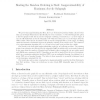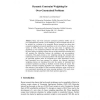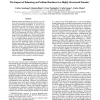93 search results - page 2 / 19 » Hard constraint satisfaction problems have hard gaps at loca... |
FOCS
2008
IEEE
13 years 10 months ago
2008
IEEE
We prove that approximating the Max Acyclic Subgraph problem within a factor better than 1/2 is Unique-Games hard. Specifically, for every constant ε > 0 the following holds:...
FOCS
2006
IEEE
13 years 10 months ago
2006
IEEE
Combinatorial allocation problems require allocating items to players in a way that maximizes the total utility. Two such problems received attention recently, and were addressed ...
PRICAI
1998
Springer
13 years 8 months ago
1998
Springer
Many real-world constraint satisfaction problems (CSPs) can be over-constrained but contain a set of mandatory or hard constraints that have to be satisfied for a solution to be ac...
AAAI
2006
13 years 5 months ago
2006
Random problem distributions have played a key role in the study and design of algorithms for constraint satisfaction and Boolean satisfiability, as well as in our understanding o...
IJCAI
1993
13 years 5 months ago
1993
Constraint satisfaction problems involve finding values for problem variables that satisfy constraints on what combinations of values are permitted. They have applications in many...



